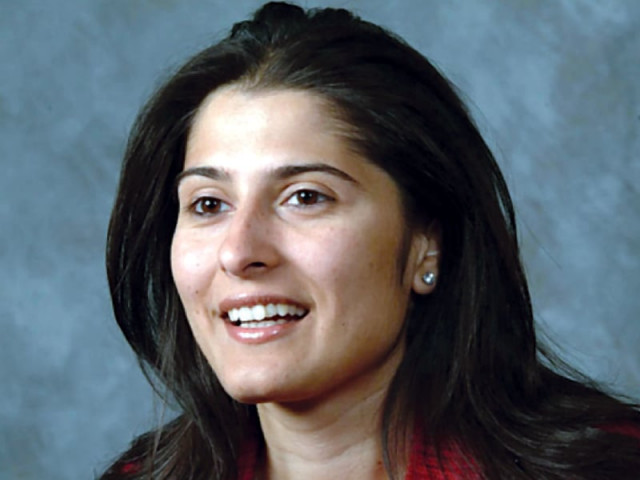Much-needed evaluation: Situating sustainability in education innovation
Panellists debate possibilities for disruptive innovation, scope within education system.

Sharmeen Obaid Chinoy
Most celebrated heroes in our popular national discourse hail from the partition era. Unfortunately, we have cast a blind eye to many contemporary unsung heroes living among us in the present age.
This fact was pointed out by Sharmeen Obaid Chinoy, academy award-winning documentary filmmaker, while speaking at a session of ‘DisruptEd — ideas and conversation for disruptive innovation in education’, at Aiwan-e-Quaid, Fatima Jinnah Park on Wednesday. The day-long event comprised of sessions on e-learning, teaching methods, declining prime time significance of education and the future of disruptive innovation in Pakistan.
In her interactive session ‘Telling the Innovation Story: Why doing is not enough’, a participant asked Chinoy why people are uninterested in listening to others’ stories. “All that matters is how a story is pitched”, she answered, suggesting her audience use the elevator pitch approach while telling tales about oneself.
“An elevator pitch is a brief, persuasive speech that you use to trigger interest in what you are doing and why. You can also use an elevator pitch to create interest in a project, an idea, or a product — or in yourself,” she added.
She further commented that although she has toured the globe, the one perception about Pakistan which stuck is that the country has a bad image.
“I would beg to agree with this, because this is the way we tell our story to the outside world,” said Chinoy.
Commenting on a video showcased earlier, which told the story of a lady in Lyari, Karachi who runs a school for underprivileged children which also engages their parents, the Academy Award-winning documentarian said people do not tell stories, just because they do not know how to.
In another session on ‘Disruptive Innovation in Public Sector: The quest for better, faster, cheaper’, Ahmed Ali from Institute of Social and Policy Sciences said that people often talk about allocating more resources for education, but they forget to utilise the released amount in an optimum manner.
“There is no proper procedure or monitoring of such releases to check whether the project for which funding was sought ever got completed,” he added.
Another group of panellists discussed whether e-learning is a viable option for over 25 million Pakistani children who are out of school. Capital Administration and Development Division Joint Secretary Rafique Tahir proposed the notion that first of all, Pakistan needs an e-learning policy, which is inarguably the future route of education. Besides, he stressed the need to conduct an analysis to situate whether basic needs in schools should be fulfilled first, or computers and high-tech gadgets provided to such institutions.
In a similar vein, The Communicators Managing Director Fakhira Najeeb shared her organisation’s experience with disseminating learning through radio and interactive characters, which led to zero absenteeism and the development of children’s interest in mathematics, English and Urdu.
A session on 3G and 4G emphasised the use of technology for improving the provision of education to remote areas, and disrupting current practices of knowledge dissemination. Discussants argued that content developers have failed to fully-exploit the potential of 2G technology, so the introduction of 3G technology will not disrupt the provision of education.
Punjab Assembly member Sheikh Ijaz was featured as one of the disruptors of education within the political realm. “I believe education can only be fixed if parliamentarians and politicians truly take ownership of the system,” said Ijaz.
Serious issues exist in terms of existing capacity and the government’s misplaced priorities in improving the standards of public sector schools, remarked Member National Assembly Asad Umar.
“While the private sector presents a dramatic increase in the quality of education provided, accessibility and affordability for the masses remains limited. The government needs to adopt a single schooling system across the board to remove discrimination in the education system,” added Umar.
The instructive event was organised by Alif Ailaan.
Published in The Express Tribune, April 17th, 2014.



















COMMENTS
Comments are moderated and generally will be posted if they are on-topic and not abusive.
For more information, please see our Comments FAQ